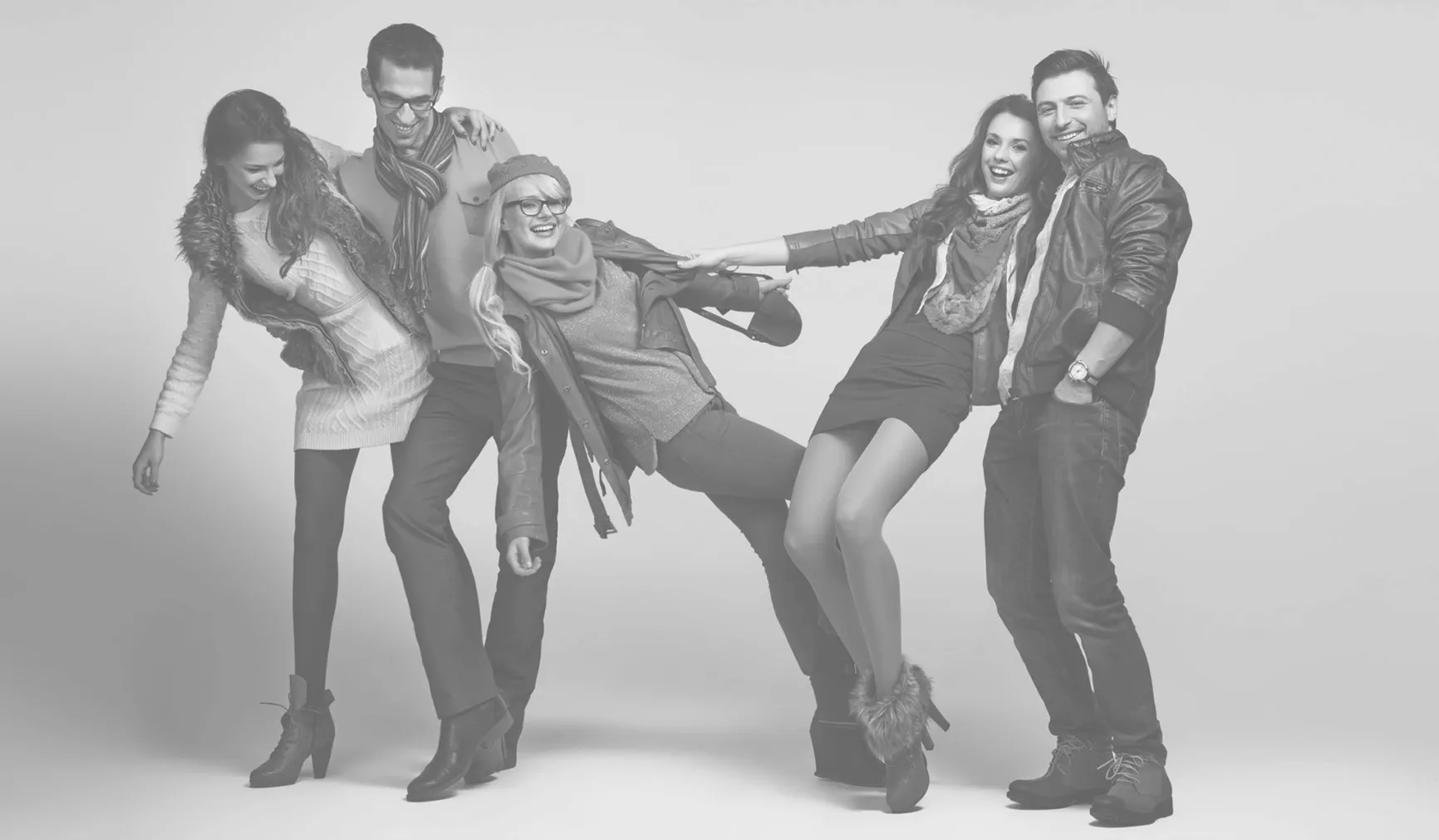服装与个性
译/易鑫 贺莺

扫码听读
For eight years, I had to wear a uniform to school.While doing so, I never felt quite myself.The colors were boring, and the style expressed severity and conformity.Only when I made the uniform my own by adapting it to my tastes as much as I could did I begin to feel comfortable with it.
整整八年,我都得穿着校服上学。其间一直感到不自在。颜色单调,款式诉说着严肃与服从。直到后来尽可能按自己的品味改了校服,才觉得是自己的衣服,穿起来舒爽了。
2Almost everyone has felt something similar; wearing clothes you don’t like,that don’t suit your tastes, elicits a general feeling of unease and discontent.
3This attests to the fact that clothes have more than a merely utilitarian role in life.
2几乎每个人都有过类似的感受;穿上不喜欢、不符合自己品味的衣服,往往会感到不自在、不满意。
3这说明了一个事实:服装在生活中不仅具有实用功能。
4服装可以传递着装者的某些信息。正如前时尚编辑、评论人卡琳·富兰克林所述,“对于意欲破译服装语言的人来说,时尚提供了一场富含社会意义和政治意义的对话……人们认识到,服装的功用远不止是防护或保暖,服装蕴含着宣示或强化个人与集体特质的力量。”随着服装业的发展、着装法规和习俗的日趋衰微,人们开始越来越多地将着装作为表达个人价值观的方式。
4Clothes communicate something about the wearer.As commentator and former fashion editor Caryn Franklin writes, “Fashion offers a dialogue rich with social and political meaning for those who want to unlock the language of clothes...Way beyond functions of protection or warmth, we recognize the power of clothes to proclaim or augment individual and collective identity.”Withthe growth of industry andthe withering ofsartorial1sartorial服装的;缝纫的。laws and customs, people increasingly turned to their wardrobes as a means of expressing their values.
5The effect of different styles is, in the words of Virginia Postrel2美国作家及文化批评家,1982年毕业于普林斯顿大学。擅长从经济视角谈论文化现象。2011年获得巴斯夏新闻奖。, so “immediate, perceptual, and emotional” that often there seems to be no cause for why we like certain aesthetics but not others.But,as Postrel argues in The Substance of Style, “Aesthetics conjures meaning in a subliminal, associational way, as our direct sensory experience reminds us of something that is absent, a memory or an idea.” The associations we develop throughout our lives imbue certain clothes or styles with meaning, and that meaning causes us to like or dislike those looks.
5用弗吉尼亚·波斯特莱尔的话来说,不同着装风格具有“直接、感性、情绪化”的效果,从而让审美偏好往往显得毫无依据。不过,波斯特莱尔曾在《风格的实质》一书中指出:“美学是以一种潜意识的、联想的方式创造意义,正如直接的感官体验一样,会令人想起某种缺失的事物,一段记忆或是一个想法。”我们一生中形成的种种联想会赋予某些服装或风格意义,而这种意义又会导致人们喜爱或厌恶那些式样。
5Take colors, for instance.We like or dislike certain colors because of the attributes or moods we associate with them.Those associations might be cultural, such as how, in the West, most people associate white with purity and innocence, whereas in China, people associate it with death and mourning.Or we can form associations based on our personal experience and values.Antoine de Saint-Exupéry’s book The Little Prince offers a fictional example of the latter: After meeting the blond little prince, the fox says that from now on, the sight of wheat, which had been meaningless to him, will bring him pleasure because it will remind him of the color of the boy’s hair.
6以颜色为例。人们因为将颜色与某些属性或情绪联系到一起,所以才会喜欢或厌恶某些颜色。这些联系可能与文化相关。例如:在西方,大部分人将白色与纯洁和天真联系在一起;而在中国,人们将白色与死亡和哀悼联系在一起。此外,人们会基于个人的经历和价值观来创造联系。安托万·德·圣-埃克苏佩里所著《小王子》就是后者在文学作品中的例证:遇见金发小王子后,狐狸说,麦子对他而言曾经毫无意义,但从今往后,看见麦子将会感到快乐,因为这会让他想起小王子的发色。
7As Postrel puts it, “I like this becomes I’m like this.” Of all the things we buy, clothes perhaps most easily and deeply express our identity.Clothes are an integral part of our personal appearance, which Postrel calls “the most inescapable signal of identity.” The wide variety of affordable clothing gives us a great deal of control over our appearance, enabling us to express ourselves in ways that fit the occasion.
8Certain clothes often evoke particular ideas about the types of people who wear them.Someone who likes to wear sweatpants all the time, for instance, will have different values and personality traits than someone who wears elegant clothes.Many of the latter consider sweatpants, as late fashion designer Karl Lagerfeld put it, “a sign of defeat.” But,some regularly wear sweats because they are comfortable, relaxed, and integrate with their focus on getting things done.
7正如波斯特莱尔所说,“‘我喜欢这样’会变成‘我像这样’。”在人们购买的各种物品当中,服装或许最能轻松而深刻地表达个性。服装是个人仪表中不可或缺的部分,波斯特莱尔称其为“最无法逃避的个性信号”。经济实惠的服装款式繁多,让人们可以充分掌控自己的面貌,在不同场合以得体的着装表达自我。
8人们会对穿着特定服装的人产生特定的看法。例如,喜欢整天穿运动裤的人和喜欢穿着优雅服装的人,价值观和个性会迥然不同。后者中有许多人像已故服装设计师卡尔·拉格斐那样,将运动裤视为“失败的象征”。而有些人则经常穿运动装,因为运动装宽松、舒适,能让自己专心做事。
9Clothing patterns might contain lines and shapes with which we associate meaning.For instance, we generally associate straight lines with purpose,intellect, and order; and curved lines with passivity, softness, nature, and pliability.As for shapes, we might associate squares with stability, and triangles with dynamism.Patterns can also represent symbolic objects—for instance,butterflies, which we often associate with beauty, peace, or metamorphosis.We might also associate certain fabrics with different qualities of character; the down-to-earth sobriety of tweed conveys something different than the cold elegance of satin.Particular cuts, colors,ornaments, and accessories can add layers of meaning to our clothing, too.
9服装上的花纹图案可能包含被赋予了意义的线条和形状。例如,人们通常会把直线与目的、智力和秩序联系起来;把曲线与顺从、柔软、自然和柔韧联系起来。至于形状,人们可能会把方形与稳定联系起来,把三角形与活力联系起来。图案还可以代表具有象征性的物体。例如,蝴蝶通常与美丽、和平或蜕变相联系。人们还可能会把某些面料与不同的性格品质联系起来;粗花呢务实庄重,绸缎冷艳优雅,两者传递出不同的内涵。特定的剪裁、色彩、饰品和配饰也都可以为服装增添多层意义。10Because associations can differ widely from person to person and culture to culture, others might read into our outfits something different than we intend and, thus, misunderstand our values and identity.But as long as we are not wearing our clothes specifically to communicate certain traits to others in a specific context (such as professionalism at a job interview), what others think of our clothes should be less important than what we think of them and why we choose to wear them.We ought to dress to benefit ourselves, not others.10这些联系会因人、因文化而迥异,所以别人对我们所穿服装的解读,可能会与我们自己的意图有所不同,从而对我们的价值观和个性产生误解。但是,只要我们的穿着不是为了在特定场合让他人了解某些特质(例如在面试中表现专业素质),那么别人的看法就没那么重要了,重要的是自己怎么看待以及为什么选择这样着装。穿衣应该是为了取悦自己而不是他人。
11As Franklin writes, “clothes have the psychological power to elevate our sense of self.” But they also have the power to weaken it.This happens because our clothes can either express our identity or contradict it.If they express it, they make us feel good.If they contradict it,then they make us feel uncomfortable.Each of us has an image of our true self,as Postrel explains, “not as a disembodied set of thoughts but as a visual, tactile creature, whose authentic identity is reflected in the sensory aspects of...person, places, and things.People can look at me and see something true about who I really am.I can see myself reflected in my surroundings.Surface and substance will match.This is the aim of aesthetic meaning—to capture and convey identity, to turn our ineffable sense of self into something tangible and authentic.”
11富兰克林曾说:“衣着具有提高自我意识的精神力量。”不过,衣着同样也具有削弱自我意识的力量。这是因为衣着既可能展现个性,也可能与个性相左。展现个性,会让自我感觉良好。与个性相左,会让自己感到不适。每个人心中都有一个真我形象,就像波斯特莱尔解释的那样,“(这种形象)不是一组无形的思想,而是一种看得见、摸得着的东西,其真实性可以从……人物、场所和事物中的感知层面得到反映。别人看到我,就能感知到某种真我本色。我也可以感知自身在环境中的反映。外表与内在将达到统一。这就是美学意义的宗旨:捕捉并传递个性,把难以言表的自我意识转化为有形的真实外物”。
12In other words, clothing enables us to integrate mind and body, to express our values at the perceptual level.
12换言之,衣着让我们身心合一,在感知层面表达出自身的价值观。
13Wearing clothes we like serves an important psychological function: It enables us to experience and express our identity visually and tactilely.The more we consciously identify why we like certain clothes, the more we can choose those that best express our values—and the more pleasure and confidence we can gain from wearing them.■

13穿上喜欢的服装有一个重要的心理功能:在视觉和触觉上体验和彰显个性。我们越是有意识地弄清自己喜欢某些服装的原因,就越能选中最能体现自身价值观的服装——从着装中收获的乐趣和自信也就越多。 □

